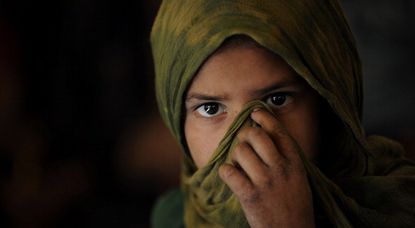Bacha posh: why some Afghan girls are raised as boys
Generations of girls are dressed up as boys so that they can be afforded basic freedoms – but at what cost?

Bacha posh, directly translated as "dressed up like a boy" from the Persian dialect Dari, is an ancient practice that still occurs in parts of Afghanistan and Pakistan today.
Brought to the world's attention by New York Times journalist Jenny Nordberg, the hidden practice of bringing up a young girl as a boy involves altering her physical appearance and giving her a male name.
There are no official statistics, but most Afghans will know at least one bacha posh in their family or community, according to Nordberg. The child will normally only be allowed to return to life as girl once she goes through puberty.
Subscribe to The Week
Escape your echo chamber. Get the facts behind the news, plus analysis from multiple perspectives.

Sign up for The Week's Free Newsletters
From our morning news briefing to a weekly Good News Newsletter, get the best of The Week delivered directly to your inbox.
From our morning news briefing to a weekly Good News Newsletter, get the best of The Week delivered directly to your inbox.
The practice can occur in any household, writes Nordberg, regardless of wealth, status or ethnicity. "The only thing that binds the bacha posh girls together is their families' need for a son in a society that undervalues daughters and demands sons at almost any cost."
Neither is it a phenomenon unique to the region. Females have masqueraded as men in both the East and the West throughout history, for similar reasons to the bacha posh.
Why does it happen?
In Afghanistan, described by the UN as the world's most dangerous country to be a woman, where the average life expectancy is 44 years, there are obvious benefits to even just appearing to be a man.
"For Afghan girls, posing as a boy opens up a whole new world", writes Nordberg in her book The Underground Girls of Kabul. "It allows her to see and experience things most girls and young women in Afghanistan never do."
Dressing as a boy gives young girls a wide range of freedoms, from simply leaving the house alone, to receiving an education and having a job. In a tribal patriarchy where men are more valued, appearing to have a son will also afford a family more respect within the community.
"I know it's very hard for you to believe why one mother is doing these things to their youngest daughter," one woman told Nordberg. "But I want to say for you, that some things are happening in Afghanistan that are really not imaginable for you as a Western people."
Nordberg disagrees, writing in The Guardian: "A great many people in this world would be willing to throw out their gender in a second if it could be traded for freedom."
What are some of the consequences?
"Anecdotal reports tell us that many girls relish their time as boy," writes Afghani paediatrician Nadia Hashimi in Psychology Today. This creates a problem when they are expected to make a seamless transition back to being female in their teens, an experience they often find traumatic, she says.
Having lived their entire childhood in relative freedom, they are suddenly expected to "transform into subordinate wives and mothers", writes Nordberg. Readapting to life as a woman in Afghan society is often impossible, with some continuing to live their lives as men well into adult life.
"Being a man gives you so many privileges", one bacha posh woman told Time magazine. "You own the world and everything is yours."
Hashimi also suggests the practice could also be a recipe for gender dysphoria."I had to change my thoughts and everything inside my mind," one former bacha posh told Nordberg. Another told her "nothing in me feels like a girl".
Looking back on her experience, one bacha posh woman revealed: "It would have been better to grow up as a girl, since I had to become a woman in the end."
Qazi Sayed Mohammad Sami, head of the Balkh Human Rights Commission, describes it as a breach of human rights."We cannot change someone's gender for a while. You cannot change a girl to a boy for a short period of time. It's against humanity," he told the BBC.
But Nordberg argues that despite the long-term negative consequences, it is a practice she believes will continue until the treatment of women in Afghanistan changes. "When one gender is so suppressed and so unwanted, there will always be those who try to pass over to the other side, to reach for the small freedoms every human should have."
Create an account with the same email registered to your subscription to unlock access.
Sign up for Today's Best Articles in your inbox
A free daily email with the biggest news stories of the day – and the best features from TheWeek.com
-
 5 highly educational cartoons about student protests
5 highly educational cartoons about student protestsCartoons Artists take on apolitical camping, the National Guard, and more
By The Week US Published
-
 French schools and the scourge of teenage violence
French schools and the scourge of teenage violenceTalking Point Gabriel Attal announces 'bold' intervention to tackle rise in violent incidents
By The Week UK Published
-
 On the trail of India’s wild lions at Sasan Gir National Park
On the trail of India’s wild lions at Sasan Gir National ParkThe Week Recommends The sanctuary is a 'roaring' conservation success
By The Week UK Published
-
 How would we know if World War Three had started?
How would we know if World War Three had started?Today's Big Question With conflicts in Ukraine, Middle East, Africa and Asia-Pacific, the 'spark' that could ignite all-out war 'already exists'
By Harriet Marsden, The Week UK Published
-
 The issue of women and conscription
The issue of women and conscriptionUnder the radar Ukraine military adviser hints at widening draft to women, as other countries weigh defence options amid global insecurity
By Harriet Marsden, The Week UK Published
-
 Ukraine's unconventional approach to reconstruction
Ukraine's unconventional approach to reconstructionUnder the radar Digitally savvy nation uses popular app to file compensation claims, access funds and rebuild destroyed homes
By Harriet Marsden, The Week UK Published
-
 Will Ukraine's leadership reset work?
Will Ukraine's leadership reset work?Today's Big Question Zelenskyy hints at ousting of popular military chief, but risks backlash amid dwindling munitions, delayed funding and Russian bombardment
By Harriet Marsden, The Week UK Published
-
 Imran Khan sentenced to 10 years: how powerful is Pakistan's military?
Imran Khan sentenced to 10 years: how powerful is Pakistan's military?Today's Big Question The country's armed forces ignore country's economic woes, control its institutions and, critics say, engineer election results
By Harriet Marsden, The Week UK Published
-
 What is Iran's endgame?
What is Iran's endgame?Today's Big Question Tehran seeks to supplant US and Saudi Arabia as dominant power in Middle East while forcing Israel to end Gaza war
By Harriet Marsden, The Week UK Published
-
 Israel proposes two-month pause in Gaza war in exchange for all Hamas hostages
Israel proposes two-month pause in Gaza war in exchange for all Hamas hostagesSpeed Read Deal doesn't include an agreement to end war, but might be 'the only path that could lead to a ceasefire', said US officials
By Harriet Marsden, The Week UK Published
-
 Nato official warns of all-out war with Russia in next 20 years
Nato official warns of all-out war with Russia in next 20 yearsSpeed Read Civilians must prepare for life-changing conflict and mass mobilisation, says military chief
By Harriet Marsden, The Week UK Published